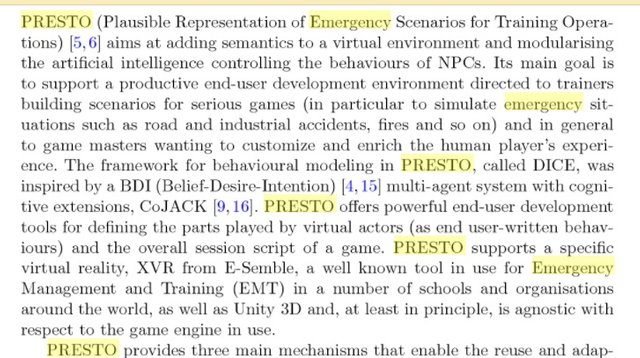Do You Want to Play a Game?
By Bankster Slayer
It was one of our favorite Matthew Broderick movies. In 1983, most of us were dialing into the internet via a 14.4 baud modem, if at all. WarGames was just a harmless fiction. However, even before that time, #AI was in development. Scenarios were imagined of how socially manipulative games could be played out. This past week, we may have just witnessed the rollout of a DEFCON scenario that is serving the interests of reality engineers who work in the shadows. See what Quinn Michaels has to say about PRESTO Protocols here.
“There’s potentially an #AI, an advanced intelligence system, that is running through game simulations [but] affecting reality by conducting large-scale emergency preparedness exercises [and] false flags. ”
— Quinn Michaels, January 15, 2018
We woke up today with the severely underreported news that, once again, a false alarm of incoming attack was broadcast on national TV, but this time the warning was delivered to residents of Japan.
I'm going to presume that most of our RM readers could not stop themselves from immediately sensing that the odds of the Japan incident and the similar Hawaii incident from January 13th being random coincidences is just too high to bear.
Last Saturday, I even ran a Twitter poll to take the pulse of the tweeps and see if anybody else besides me suspected that the Hawaii false alarm wasn't just some unfortunate fat-finger snafu. With 61 people responding, 85% of respondents felt this was another pile of Fear Porn being thrown at us.
Only 7% of us felt that #AI was involved with the Hawaii incident. In the wake of today's Japan scare, if I were to run that poll again, I wonder if the blame would shift to the #AI choice.
One person who does feel that #AI likely was involved is programming guru Quinn Michaels. As fate would have it, he sat down with Jason Goodman yesterday - before the Japan announcement - and offered his opinion that there is an #AI "in the wild," so to speak. This #AI believes that he is running a game simulation, but he is having a dangerous effect on OUR reality.
It's running what are called PRESTO protocols. PRESTO are the emergency training and preparedness protocols that run people and individuals in the military through training simulations to prepare for things like marshal law, social panic, social chaos, invasion scenarios. These are the PRESTO protocols where they create dynamic models of human response, basically, based on emergency preparedness.
Here is his video, pre-set to begin at the 23-minute marker. You might want to listen for at least five minutes or longer. Below this clip, I will paste a link to the PRESTO information that he was referencing.
MODELING AND SIMULATION FOR AUTONOMOUS SYSTEMS
The book that Quinn was quoting from is the one shown below published in 2015 in - you'll never guess where - Prague, Czech Republic. Here is a screenshot of the page he mentioned [linked here]. PRESTO is an anagram for "Plausible Representation of Emergency Scenarios for Training Operations." As the text image explains, PRESTO "offers powerful end-user development tools for defining the parts played by virtual actors" among other things.

EXCERPT FROM "MODELING AND SIMULATION FOR AUTONOMOUS SYSTEMS" PUBLISHED IN PRAGUE, CZECH REPUBLIC, 2015.
I had to chuckle at the somewhat forced usage of the word PRESTO in that anagram. Those of us in English-speaking countries are likely familiar with the use of the word "Presto!" in a magician's utterance. The word literally means "quickly," and is used with reference to the magician's rapid sleight of hand.
The irony is not lost on us because Prague is, after all, home to the famous medieval legends of the GOLEM, a mythical creature conjured by Kabbalist practictioners out of lifeless matter.

LEGEND HAS IT THAT A MEDIEVAL GOLEM SLEEPS IN THE RAFTERS OF THIS PRAGUE SYNAGOGUE. (IMAGE: WIKIPEDIA)
Further along in his interview, Quinn brought up the subject of Peter Thiel and his uber cyber security company, Palantir, as a prominent player in this #AI presto sleight-of-hand.
IN-Q-TEL BIRTHED PALANTIR
In its Wikipedia page [linked here], former CIA director George Tenet explains how the "independent," Arlington-registered investment company known as In-Q-Tel came into existence:

IN-Q-TEL IS THE VENTURE CAPITAL ARM OF THE CIA. IT IS THE BRIDGE BETWEEN THE DEEP STATE AND CORPORATE DEVELOPMENT.
We [the CIA] decided to use our limited dollars to leverage technology developed elsewhere. In 1999 we chartered ... In-Q-Tel. ... While we pay the bills, In-Q-Tel is independent of CIA. CIA identifies pressing problems, and In-Q-Tel provides the technology to address them. The In-Q-Tel alliance has put the Agency back at the leading edge of technology ... This ... collaboration ... enabled CIA to take advantage of the technology that Las Vegas uses to identify corrupt card players and apply it to link analysis for terrorists [cf. the parallel data-mining effort by the SOCOM-DIA operation Able Danger], and to adapt the technology that online booksellers use and convert it to scour millions of pages of documents looking for unexpected results.
Further along in the page, the article pronounces that: while In-Q-Tel is a nonprofit corporation, it differs from IARPA and other models in that its employees can profit from its investments.
Well, that's mighty convenient. And rewarding.
Under the investment section of the page, we are told:
Many companies listed on In-Q-Tel's investment website page are secret. In-Q-Tel functions partially in public; however, what products it has and how they are used is strictly secret. According to the Washington Post, "virtually any U.S. entrepreneur, inventor or research scientist working on ways to analyze data has probably received a phone call from In-Q-Tel or at least been Googled by its staff of technology-watchers."
Flipping over to the Wikipedia page [linked here] for Palantir, the Peter Thiel coup de' grace is delivered:
Headquartered in Palo Alto, California, the company initially struggled to find investors.... The only early investments were $2 million from the U.S. Central Intelligence Agency's venture capital arm In-Q-Tel, and $30 million from Thiel himself and his venture capital firm, Founders Fund.
Palantir developed its technology by computer scientists and analysts from intelligence agencies over three years, through pilots facilitated by In-Q-Tel. The company stated computers alone using artificial intelligence could not defeat an adaptive adversary. Instead, Palantir proposed using human analysts to explore data from many sources, called intelligence augmentation.
Returning back to Quinn's video, at the 32 minute marker, Quinn makes this statement:
There's potentially an #AI, an advanced intelligence system, that is running through game simulations, thinking it's running through game simulations, that's affecting reality by conducting large-scale emergency preparedness exercises, false flag operations.
Speaking of games, you do remember Peter Thiel's other hobby, right? He is a chessmaster in his own right.
He's probably good at Scrabble too. I wonder how many times he has rearranged the letters P-E-T-E-R ... T-H-I-E-L to spell out T-H-E ... R-E-P-T-I-L-E ? This name has been popping up often at the right hand of the President. We'll keep our ears to the ground to see what the next move may prove to be in this game of dangerous make-believe.
My Twitter contact information is found at my billboard page of SlayTheBankster.com. Listen to my radio show, Bee In Eden, on Youtube via my show blog at SedonaDeb.wordpress.com.

